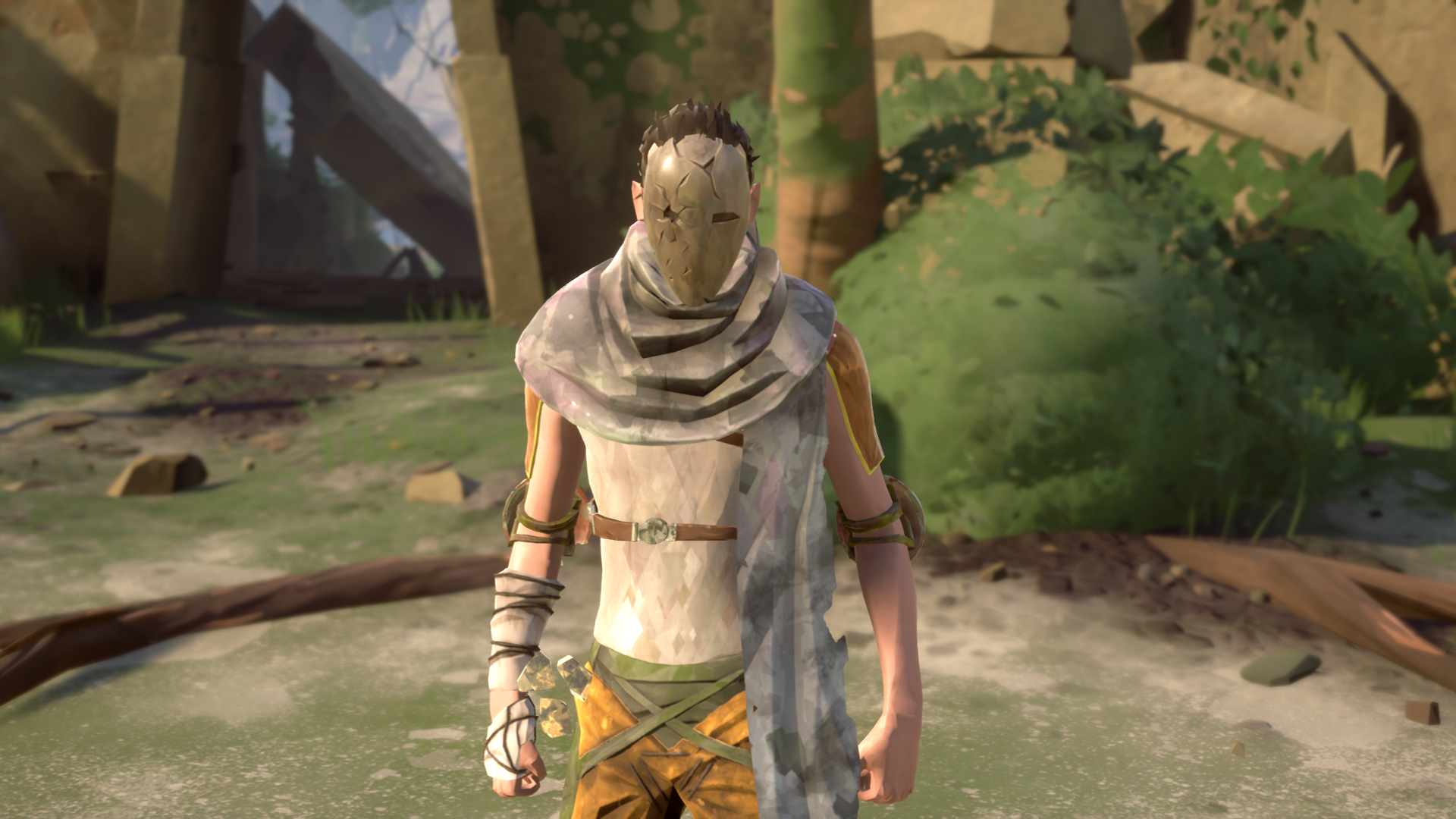Our Verdict
A great customizable fighting system and a cooperative spirit fill the empty spaces in a bleak open world.
PC Gamer's got your back
What is it? A multiplayer action RPG fighting game with a sparse story but complex, customizable fighting system.
Expect to pay $30/£25
Developer Sloclap
Publisher Devolver Digital
Reviewed on Windows 10, Core i7-6700K, 16GB RAM, GeForce GTX 980
Multiplayer Three players cooperatively, plus 1v1 matchmaking
Link Official site
Buy it: Steam, Humble Store, CDKeys
Read our affiliates policy.
There are only two good movies in my mind: 1978 Jackie Chan film Drunken Master, and 1994 Jackie Chan film The Legend of Drunken Master. And so when I met Jinn Mesca, a lonely NPC who guards a meaningless staircase in multiplayer fighting RPG Absolver, I immediately dedicated myself to mastering his drunken, stumbling fighting style. To do that, I let him beat the crap out of me for three hours.
Learning Mesca's moves wasn't fun per se, but I was motivated. I was motivated to show every player who'd formerly chased me around and knocked me down that I had been practicing, that I knew some things they didn't. I farmed him for hours, fighting him, then waiting for him to respawn, then fighting him again to slowly acquire his set of zui quan moves—wrist jab, wobble low kick, elbow stumble, all the hits. Each time I learned a new move, I spent 5 minutes (at least) editing my moveset to slot it in, chaining low attacks to leaping kicks and building series of rapid jabs to poke through my enemies' defenses. I cleared the whole deck and rebuilt it from scratch more times than I can remember.
Of course, when I went to show off my new skills, I matched with a level 60 player who stomped my body to dust with relentless combos of basic attacks and perfect counter moves. Instead of looking like a drunken boxer I looked like a drunk guy getting beat up, but that's how it goes when action RPG progression slides into a 1v1 fighting game. I rage quit after that, but I was back an hour later. Absolver is too fun for me to stay away from, even when it hurts me.
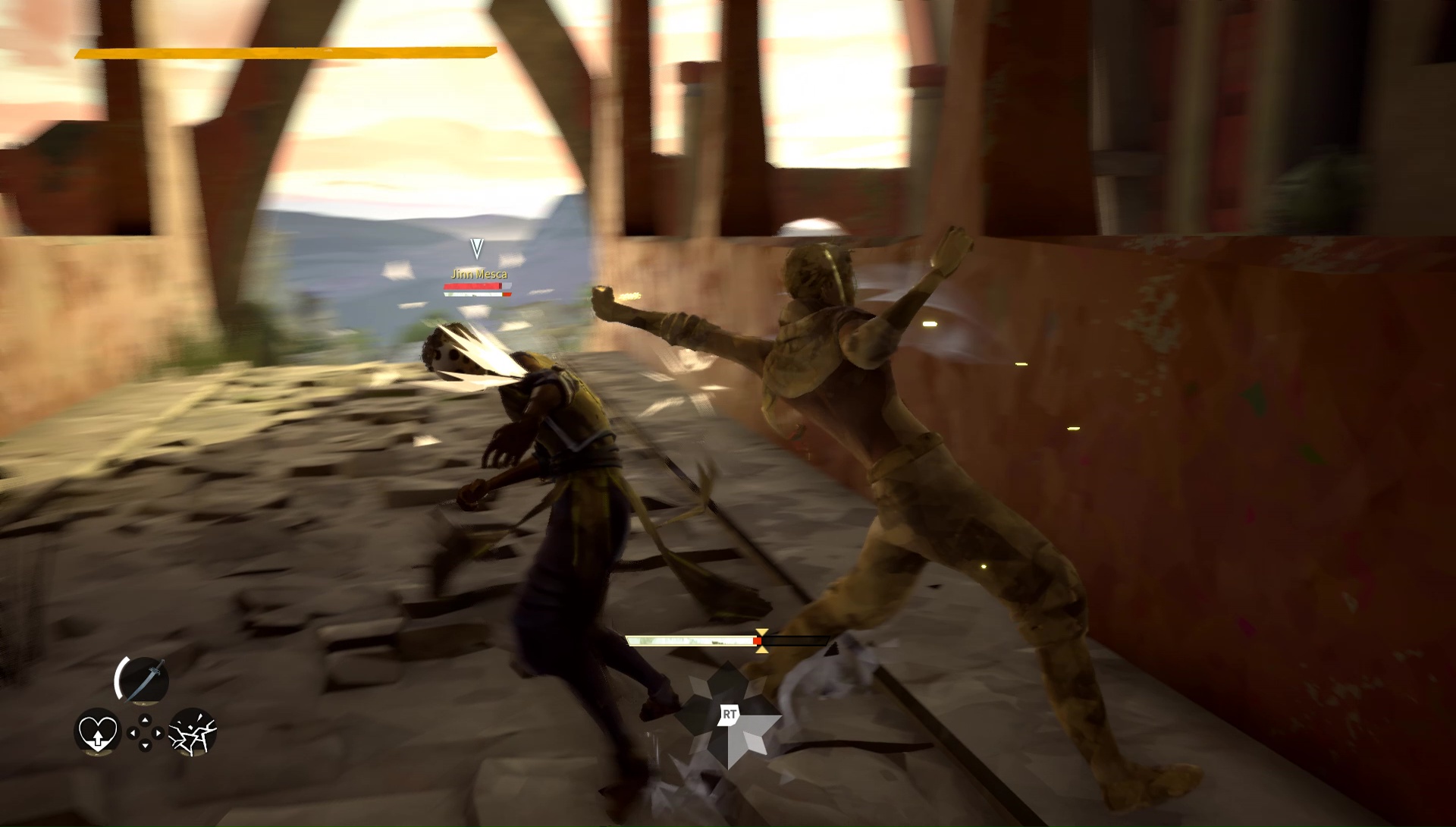
New and old
Absolver is an attempt to synthesize contradictions into something new—a third-person RPG with gear and leveling that's also a competitive fighting game, a Journey-like meditation that's constantly violent—and the result is a strangely shaped game. It takes place in a small, maze-like open world littered with AI enemies who are tethered to their posts, always silently waiting for someone to wander by for a fight. It's more gloomy than mysterious, quiet and still. There are dead ends, empty areas with no enemies, and confusing circular routes that had me mashing every key to find a map, though none came up.
The AI opponents are decent fighters, not always predictable and pretty tough, though not tougher than any competent player. Most of the time, they win in numbers, as Absolver doesn't handle locking-on to multiple enemies well, or countering attackers from all sides. To push away some of the gloom and even out group fights, up to two other players can spawn in your world through automatic peer-to-peer matchmaking (which can be turned off, or set to invite only). You can't talk to them—there's no voice or text chat—leaving communication up to a small set of emotes in a radial menu.
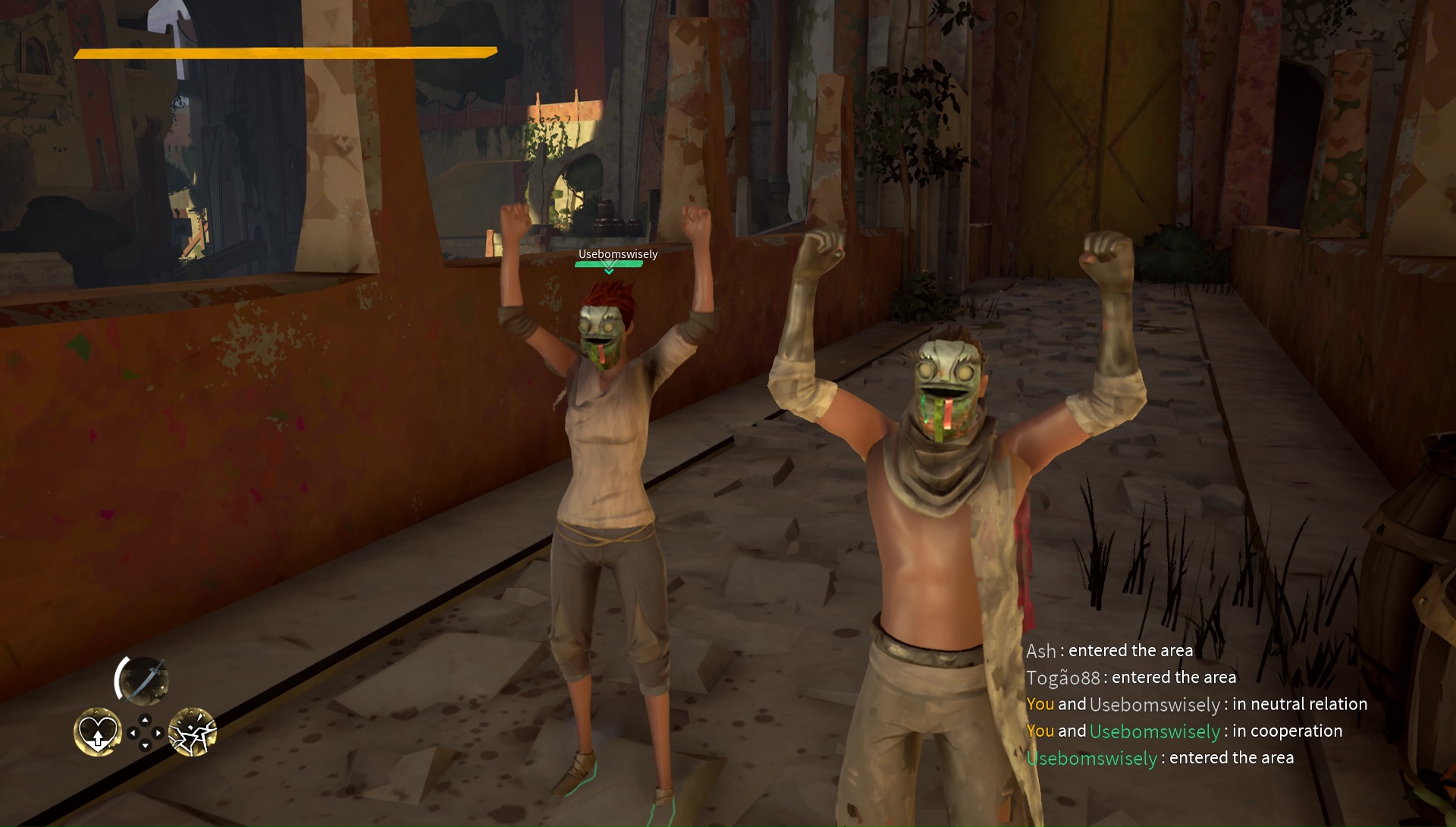
The gamble is that Absolver can drop new players into a confusing and oppressive world and rely on bows, thumbs ups, and shrugs from experienced players to guide them. When it works it can be brilliant.
At one point I was struggling to find the last Marked One, a set of special NPCs you've got to defeat to advance the barebones story. I could see him over a rubble barrier, but after running in circles for nearly an hour I still couldn't figure out how to get to him. I found another player and gave him a sad look. I gestured for him to come with me, and he followed me to the rubble. I used the thumbs up emote to 'point' at the enemy, then gave a confused shrug. He wandered off to fight a nearby group. But I just kept standing and shrugging, and eventually he got it and gestured for me to follow him. It turns out I was standing no more than 20 feet away from the entrance, an archway below a staircase that you can't tell is a passageway until you're under it.
I was annoyed that Absolver's geometry can be so confusing, but also ecstatic that I was able to silently communicate my problem to a stranger and get help. Absolver's dour world often disappoints me, but I admire the thematic commitment to asceticism and how it rubs off on the players. Not content to just be a good fighting system, Absolver seeks to mold us into respectful sparring partners through its design, where growing as a fighter requires humility and silent cooperation.
It isn't required to bow to your opponent before a 1v1 match, but the last time I didn't trade bows before throwing the first punch was probably 20 fights ago.
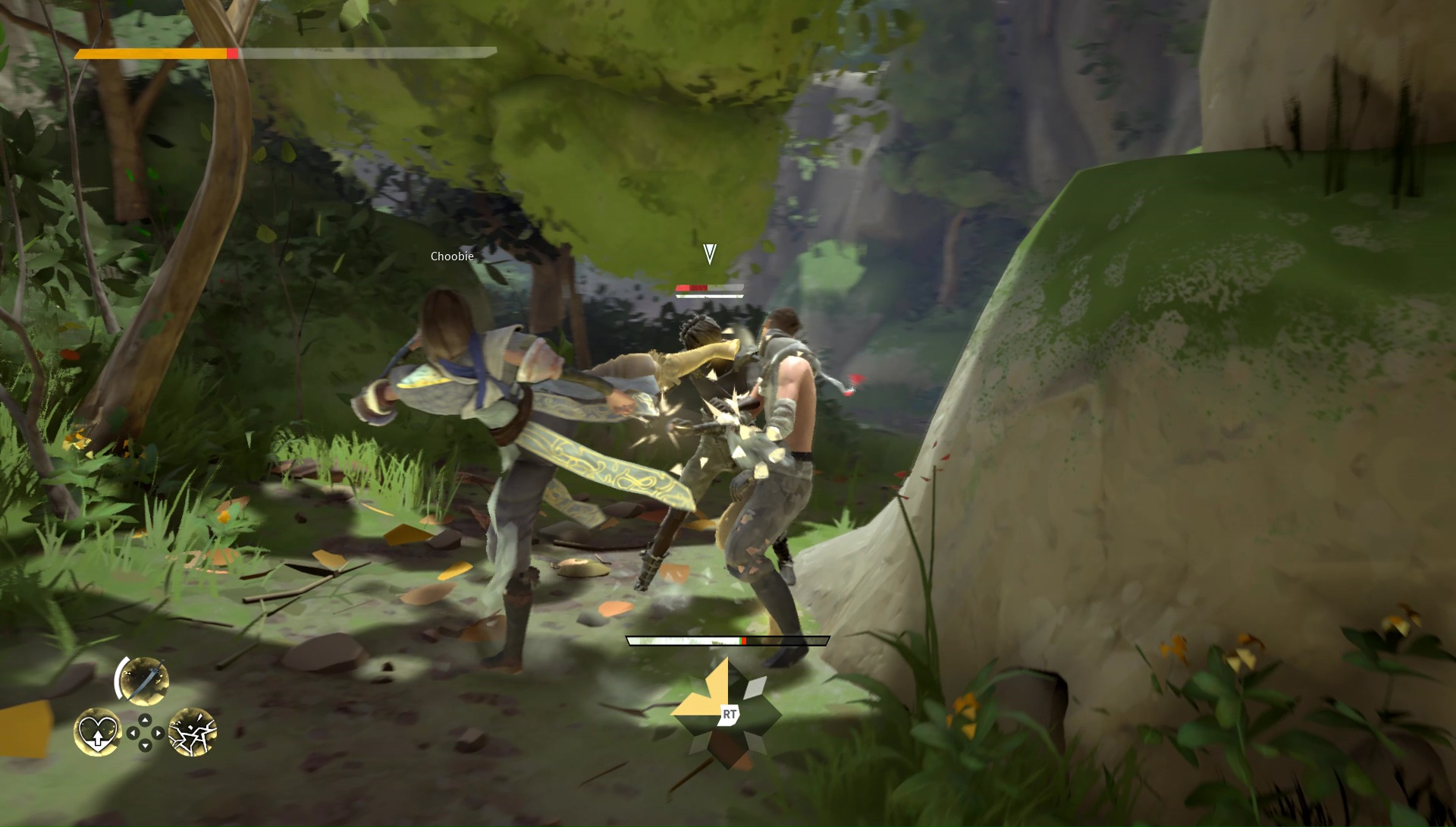
Deck building
A good level 30 player is not going to beat a good level 60 player.
The synthesis of RPG leveling and 1v1 fighting has one obvious flaw, which I broached earlier: higher level players have more strength, more health, more stamina, and better equipment than you. So not only are they usually more skilled fighters, they have a quantifiable advantage. That doesn't stop me from losing to lower level players, with my overcomplicated drunken moveset (it's about looking cool!) and my general lack of finesse. But I'm the exception. A good level 30 player is not going to beat a good level 60 player. It just won't happen, except perhaps by fluke.
Since Absolver's launch today there's enough new blood around that I'm not matching with players twice my level anymore—though I have fought a few whose level was well lower than mine, and I worry that once all the dedicated players reach max level, a smaller population of newcomers will be forced to grind among NPCs to compete. That's necessary for a while, because Absolver's fighting system takes time to figure out, though fighting the same AI characters gets old once you understand how everything works.
Fighting in Absolver is unlike fighting in most 'fighting games' in that basic blocking doesn't require predicting high or low attacks, and there are no complex inputs. Moves are chained together simply by tapping attack buttons—time the inputs right and you can speed up the attack sequence, but progression through the sequence (eg, jab, hook, jumping kick) happens automatically. I've been playing on a controller lately, but I started with mouse and keyboard, and found it totally workable—though hard on my wrist after a while.
That doesn't mean it's simple. Each fighting style has a special countering ability; in the case of mine, Windfall, I can duck, leap over, or side-step attacks, which does require predicting high, low, and charging attacks. Every action depletes stamina, which must be refilled through tactical retreats to avoid having your block broken or running out of martial arts juice. Attacks can be cancelled. And every move ends in one of four stances—eg, low and left facing, high and right facing—each of which has its own customizable main attack sequence and alternate attack.
Starting from my high-left stance, for instance, I might have set up my fighting deck to throw two quick punches and then a kick that ends in my lower-right stance. After that combo, now in a new stance, I can throw out three different moves without dropping the beat, and then maybe use an alternate attack to switch to yet another stance for a leg sweep—or however I want to set it up.
There are so many possible combinations of moves that it's easy to build totally nonviable decks, and I've done that repeatedly. But that means the opposite is also true. Half the battle in Absolver is in experimentation, building your own style by mixing attacks from multiple schools and testing it out, and that has entertained me for 20 hours and counting. It brings the excitement of trying out a new Hearthstone deck to fighting, where instead of a card combo I've decided to see what happens with a kicking-only style that emphasizes leaping over low attacks, or heavy punches contrasted with light drunken slaps.
Absolver lets us scrubs exercise our tactical brains from the safety of the practice menu.
New players don't have many attacks to choose from, but repeatedly blocking unknown moves from AI fighters or other players slowly fills a meter toward unlocking them, though that progress is only preserved if you win the fight. It's a little slow. I didn't exactly enjoy the hours of fighting Jinn Mesca so I could become him, but getting cool new moves to experiment with is so compelling that I ground it out anyway. And there is one good thing about being stomped in a 1v1 battle by a high level player: if they've formed a school, you can join it, borrow their moveset, and find out exactly how they stomped you.
The brilliant thing is that after every loss I feel like I can immediately do something about it: if I just tweak my move deck, if I just learn some new moves, or get better at hitting the timing on my combos, or observe my opponent better so I know what moves they're using, I can win. By adding progression and customization to a fighting games' high skill ceiling, Absolver lets us scrubs exercise our tactical brains from the safety of the practice menu. Maybe I can never be as good as the really good players—same here as in Street Fighter—but I can make my style look cooler, or find a move that might catch them off guard just a little and win just one tough fight if not the majority of them.
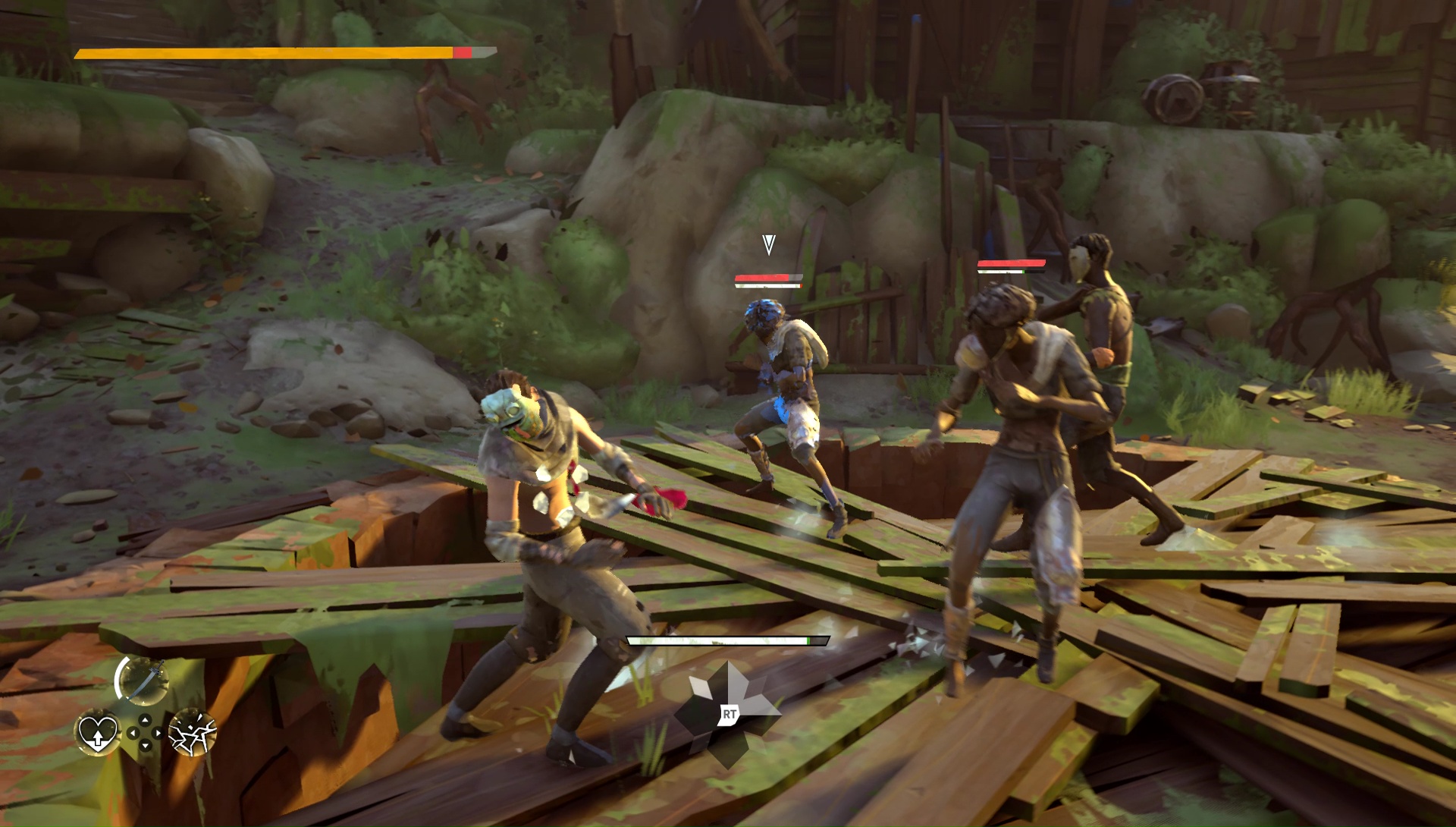
Ring out
The biggest problems with Absolver's fighting are seemingly fixable, though they are frustrating. Getting backed under ceilings such that the camera points straight down is a pain in the ass, and then there's the fall damage. Absolver is brutal when it comes to fall damage, sapping a huge chunk of your health bar for stumbles off of even low-seeming ledges, or insta-killing you if you fall off the map. Absurdly, every player also starts with a special ability that knocks back nearby enemies. Ostensibly it's for crowd control against NPCs, a way to get a breather and try to heal, but more than once it's been used to repeatedly shove me off the side of the map in 1v1 fights. That's dumb.
My list of grievances goes on: there's no proper ranked mode or leaderboard yet; there's no way to respec your character to fix early stat point allocation mistakes; the special 'tension shard' abilities like the knockback I mentioned feel out of place; and while it runs well on my GTX 980 (locked to 60 fps, mind you) there are certainly bugs. Once, while helping a friend fight one of the Marked Ones, a duplicate of the mini-boss appeared and we had to take on both. Another time I fell out of the map without dying and ran around the inside of boulders for a bit. It's crashed several times.
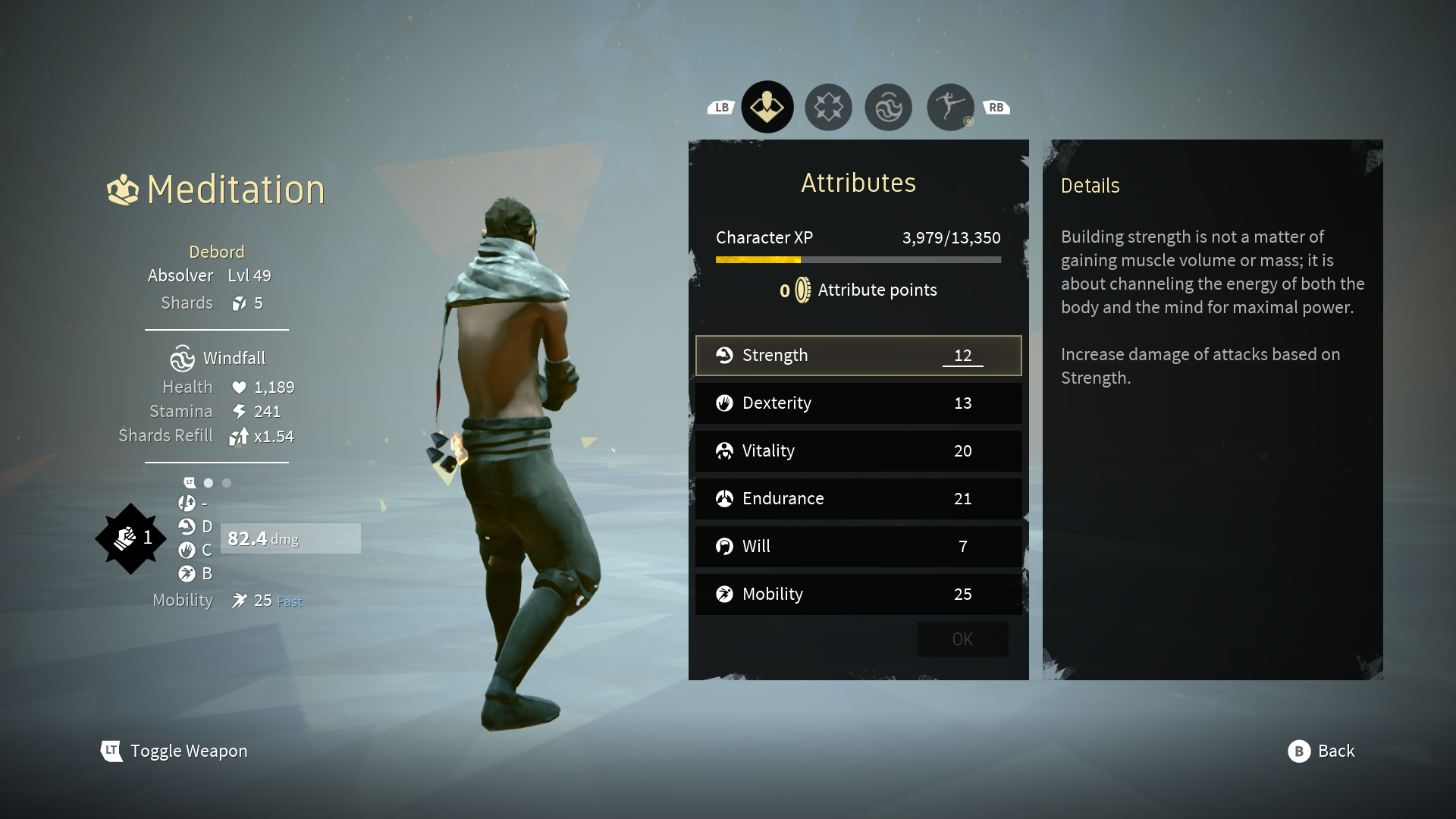
Absolver's world could use a bit of levity, but the mood of most of its population is cooperative and friendly so far.
So there's a good amount to fix or improve, but I still recommend Absolver highly, with the caveat that it is not a single-player game. You can play it alone, but I don't recommend it—the story is thin, and the critical path is just a series of quiet fights which become frustrating when there are multiple enemies and only one of you.
When I'm not seated by an altar searching for 1v1 matches, or tweaking my fighting style, I sometimes wander the now familiar world looking for new players to help out, and it's really pleasant. It's also fun when an overeager new recruit runs up to me with their fists out—there's no real consequence for sparring in the open world, so it's a free-for-all if you want it to be.
There is potential for high level players to hound newcomers abusively, but while that can be stopped by going offline for a minute and matching with new players, I've rarely seen it happen. A couple players ganged up on me recently, but the great majority of my sparring partners have been friendly, and after a quick bout we often join forces. Absolver's world could use a bit of levity, but the mood of most of its population is cooperative and friendly so far. When it comes to getting us to act like fighters who respect our fellow fighters, even despite the frustration of steep level and skill gaps, Absolver's strange synthesis of Journey and martial arts has succeeded.
A great customizable fighting system and a cooperative spirit fill the empty spaces in a bleak open world.

Tyler grew up in Silicon Valley during the '80s and '90s, playing games like Zork and Arkanoid on early PCs. He was later captivated by Myst, SimCity, Civilization, Command & Conquer, all the shooters they call "boomer shooters" now, and PS1 classic Bushido Blade (that's right: he had Bleem!). Tyler joined PC Gamer in 2011, and today he's focused on the site's news coverage. His hobbies include amateur boxing and adding to his 1,200-plus hours in Rocket League.
